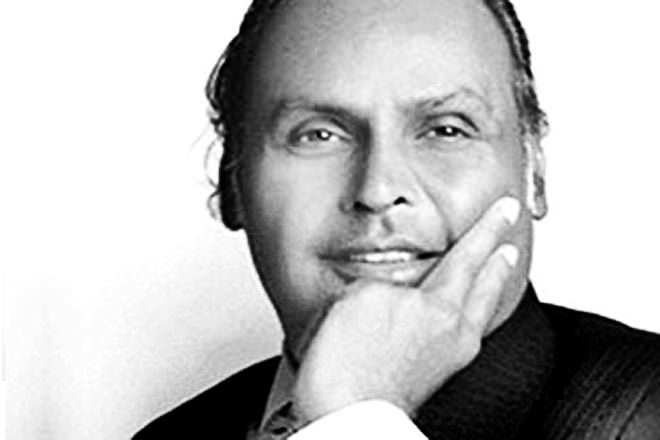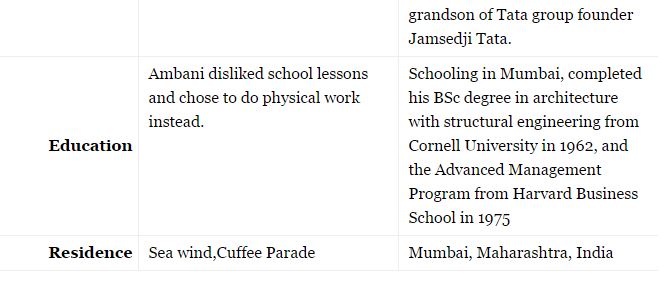Dhirubhai Ambani vs. Ratan Tata


Dhirubhai Ambani and Ratan Tata are among the most prominent business 20th (and early 21st) century business tycoons in India. Interestingly, they were both born on December 28.
Dhirajlal Hirachand Ambani, popularly known as Dhirubhai was born December 28, 1932. He was an Indian rags-to-riches business tycoon who founded Reliance Industries in Mumbai with his cousin. Ambani took his company (Reliance) public in 1977, and by 2007 the combined fortune of the family was 60 billion dollars, making the Ambani's the second richest family in the world. Ambani died on July 6, 2002.
Ratan Naval Tata popularly known as Ratan Tata was born on December 28, 1937, is the present Chairman of Tata Sons and therefore, Tata Group, India's largest conglomerate founded by Jamsedji Tata and consolidated and expanded by later generations of his family. Ratan Tata is also best known for the face behind changing India's automotive industry into global climate change era. Most his holdings are in Tata Sons, the holding company of the group, began as inherited family shareholding. He was listed among the 25 most powerful people in business named by Fortune magazine in November 2007.
Comparison chart
Dhirubhai Ambani
Ratan Tata
Similarities

Differences


Early Life
Dhirubhai Ambani moved to Aden, Yemen when he was 16 years old. He worked with A. Besse & Co. for a salary of Rs.300 (Present Day $6.49). Two years later, A. Besse & Co. became the distributors for Shell products, and Dhirubhai was promoted to manage the company's filling station at the port of Aden. He was married to Kokilaben and had 2 sons, Mukesh, Anil and two daughters, Nina Kothari, Deepti Salgaonkar. He also worked in Dubai for some time during his early years.
Ratan Tata’s childhood was troubled; with his parents separating in the mid-1940s when he was a seven year old. He completed his BSc degree in architecture with structural engineering from Cornell University in 1962, and the Advanced Management Program from Harvard Business School in 1975. He joined the Tata Group in December 1962, after turning down a job with IBM on the advice of JRD Tata. He was first sent to Jamshedpur to work at Tata Steel. He worked on the floor along with other blue-collar employees, shoveling limestone and handling the blast furnaces. He never married.
Career graph
Dhirubhai Ambani founded Reliance Industries in 1958. After that it was a story of expansions and success.
- 1958 - Moved to Mumbai to start his own business "Majin" in partnership with Champaklal Damani, his second cousin, importing polyester yarn and spices made profit
- 1965 - Champaklal Damani and Dhirubhai Ambani ended their partnership and Dhirubhai started on his own.
- 1977 - Started his first textile mill at Naroda, in Ahmedabad and the brand "Vimal", which was named after his elder brother Ramaniklal Ambani's son, Vimal Ambani. Dhirubhai Ambani is awarded with starting the equity cult in India with Reliance's IPO.
- 1982 - Ambani began the process of backward integration, setting up a plant to manufacture polyester filament yarn.
He then diversified into chemicals, petrochemicals, plastics, power. The final phase of Reliance’s diversification occurred in the 1990s when the company turned aggressively towards petrochemicals and telecommunications.
Ratan Tata was instrumental in ushering in a wide array of reforms. It was under his stewardship that Tata Consultancy Services went public and Tata Motors was listed in the New York STOCK Exchange.
- 1971 - Ratan was appointed the Director-in-Charge of The National Radio & Electronics Company Limited (Nelco). Nelco had 2% MARKET share in the consumer electronics MARKET and a loss margin of 40% of sales when Ratan took over.
- 1975 - Nelco eventually grew to have a market share of 20%, and recovered its losses.
- 1977 - Ratan was entrusted with Empress Mills, a textile mill controlled by the Tatas. He managed to turn it around from being a sick unit to even declaring a dividend.
- 1981 - Ratan was named director of Tata Industries.
- 1991 - He took over as group chairman from J.R.D. Tata, pushing out the old guard and ushering in younger managers.
- 2007 - Under the chairmanship of Ratan Tata, Tata Sons successfully acquired Corus Group, an Anglo-Dutch steel and aluminum producer.
- 2008, Tata Motors, under Ratan Tata, bought Jaguar & Land Rover from Ford Motor Company.
Ratan Tata's dream was to manufacture a car costing less than 100,000 rupees. He realized his dream by launching the Tata Nano in New Delhi Auto Expo on January 10, 2008. Currently he is the chairman of major Tata companies such as Tata Steel, Tata Motors, Tata Power, Tata Consultancy Services, Tata Tea, Tata Chemicals, The Indian HOTELS Company and Tata Teleservices.
Controversies
Both tycoons had their SHARE of controversies and allegations. Dhirubhai Ambani was accused of unethical business practices and manipulating government policies to suit his needs. In 1997, the Tatas were involved in the Tapes scandal related to Tata Tea in Assam. In 2008 Tata’s plant for Nano production (the 100,000 rupee or $2,500 car) in Singur, West Bengal, was obstructed by Mamta Banerjee (leader of the Trinamool Congress and Leader of the Opposition in the state of West Bengal) on the grounds of forcing people out of their land.[1] He moved it to project to Sanand near Ahmedabad, The Gujarat chief minister Narendra Modi granted him huge subsidy for building the facility, including free land.
More recently, in 2010 Tata was involved in the Radia tapes scandal and it was alleged that Tata Teleservices and Mukesh Ambani's Reliance Industries had both tried to unduly influence the political process via their lobbyist Nira Radia.
Awards
Awards for Dhirubhai Ambani
Dhirubhai did not win any Indian Government awards for civilians.
- November 2000 – Conferred 'Man of the Century' award by Chemtech Foundation and Chemical Engineering World in recognition of his outstanding contribution to the growth and development of the chemical industry in India
- June 1998 - Dean's MEDAL by The Wharton School, University of Pennsylvania, for setting an outstanding example of leadership. Dhirubhai Ambani has the rare distinction of being the first Indian to get Wharton School Dean's Medal.
- August 2001 – Economic Times Awards for Corporate Excellence for Lifetime Achievement
- Dhirubhai Ambani was named the Man of 20th Century by the Federation of Indian Chambers of Commerce and Industry (FICCI).
- A poll conducted by The Times of India in 2000 voted Him "Greatest Creator of Wealth In The Centuries". He is the true son of India'
Awards for Ratan Tata
Ratan Tata has won several awards including the Indian Government civilian awards. He serves in senior capacities at various organizations in India and he is a member of the Prime Minister's Council on TRADE and Industry.
- On the occasion of India's 50th Republic Day on 26 January 2000, he was honoured with the Padma Bhushan, the third highest decoration that may be awarded to a civilian.
- On 26 January 2008, he was awarded the Padma Vibhushan, the second highest civilian decoration.
- On 29 August 2008, the Government of Singapore conferred honorary citizenship on Ratan Tata, in recognition of his abiding business relationship with the island nation and his contribution to the growth of high-tech sectors in Singapore. Ratan Tata is the first Indian to receive this honour.
- In 2009 he was appointed an honorary Knight Commander of the British Empire.
- He has also been conferred an honorary doctorate in BUSINESS ADMINISTRATION by the Ohio State University, an honorary doctorate in technology by the Asian Institute of Technology, Bangkok, an honorary doctorate in science by the University of Warwick, and an honorary fellowship by the London School of Economics. He has recently received an honorary Doctor of Law from the University of Cambridge.
Death
Dhirubhai Ambani was admitted to the Breach Candy Hospital in Mumbai on June 24, 2002 after he suffered a major stroke. This was his second stroke, the first one had occurred in February 1986 and had kept his right hand paralyzed. He was in a state of coma for more than a week. He died on July 6, 2002, at around 11:50 P.M. (Indian Standard Time).
Ratan Tata is alive and retired from his active business. He was succeeded by Cyrus Mistry.
You May Be Interested IN